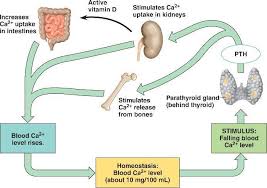Excretion
We take in a lot of things in our body the whole day. They need to be simultaneously excreted out of the body to maintain the body’s steady state. This process of removal of chemical wastes from our body is known as excretion. There are a number of substances that our body needs to get rid of. Some of them are carbon dioxide, nitrogenous wastes, excessive salts and vitamins, water and bile pigments. Excretion in humans occurs through the kidney, sweat glands, lungs etc.
Kidney
Kidneys are the chief excretory organs and are mainly concerned with the excretion of urea in the form of urine. The function of our kidney is monitored and regulated by the feedback mechanisms which involve the hypothalamus, juxtaglomerular apparatus (JGA), and the heart.
Regulation of Kidney Function

Regulation involving Hypothalamus
When there is change in the blood volume, ionic concentration or there is an excessive loss of fluid, osmoreceptors are activated and they trigger the release of vasopressin or Antidiuretic hormone (ADH) from the neurohypophysis. ADH stimulates reabsorption of water from the distal parts of the tubules and thereby preventing the water loss and diuresis. In case of sufficient body fluid, osmoreceptors are switched off hence ADH release is suppressed. ADH can also cause constriction of blood vessels resulting in an increase in the blood pressure thereby increasing the blood flow in the glomerulus and Glomerular filtration rate.
Regulation involving Juxtaglomerular Apparatus (JGA)
Regulation by JGA is known as Renin-Angiotensin mechanism. When the blood flow in the glomerulus decreases, Renin is released from juxtaglomerular (JG) cells. Renin converts angiotensin in the blood to angiotensin I and further to angiotensin II. Angiotensin II is a powerful vasoconstrictor and causes an increase in glomerular blood pressure and GFR.
Angiotensin II also stimulates the release of aldosterone from adrenal cortex gland, which facilitates reabsorption of sodium ion and water from the distal parts of the tubule and also and causes an increase in glomerular blood pressure and GFR.
The Atrial Natriuretic factor (ANF) is released when there is an increase in blood flow to the atria of the heart. It causes vasodilation and decreases blood pressure in the blood vessels. The ANF mechanism provides the necessary check to the Renin-Angiotensin mechanism.
To learn more about kidney function or other biology articles, visit BYJU’S.

I’m impressed